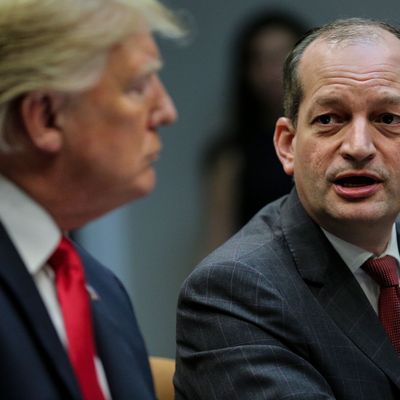
Jeffrey Epstein’s Manhattan townhouse is worth around $56 million, the New York Times reported on Monday. It has a heated sidewalk in front; inside, it contains seven floors and spans about 21,000 square feet. Plenty of space to hide a child-porn collection or a frightened underage girl, as federal prosecutors now allege. For Epstein, wealth was a shield, and a very effective one, until FBI agents and NYPD officers forced open the doors of his mansion with a crowbar on Saturday. The billionaire financier has now been charged with the trafficking and sexual abuse of minors. Epstein’s alleged crimes span years and two states, Florida and New York; according to the indictment, he “created a vast network of underage victims for him to sexually exploit.”
The indictment is news, but Epstein’s behavior is not. In 2007, he went to jail — for a mere 13 months, thanks to a sweetheart non-prosecution agreement that Epstein’s legal team cut with Alexander Acosta, then the U.S. Attorney for the Southern District of Florida. Acosta, who’s now the secretary of Labor, reduced a 53-page indictment to two felony prostitution charges, the Miami Herald reported in 2018. He didn’t even inform Epstein’s victims that a deal had been reached — an omission that likely violated federal law and allowed Epstein to return to his life with relative speed. Though he had to register as a sex offender, Epstein’s light sentence helped him keep his comfortable life intact. It probably helped him keep his powerful friends close, too. In the same Manhattan townhouse that authorities investigated on Monday, Epstein hosted a post-jail party attended by the U.K’s Prince Andrew, the New York Post reported in 2011.
New York prosecutors say they aren’t bound by Acosta’s agreement, and their decision to indict Epstein for the same set of crimes can be read as a riposte to Acosta’s treatment of the sex offender. Epstein, they wrote in a memo quoted by the Daily Beast, “is not reformed, he is not chastened, he is not repentant.” If his time is finally up, Acosta’s should be too. But Acosta, like the president who elevated him, clings to power despite incontrovertible proof that he does not deserve it. Public pressure, the Herald’s reporting, an open Justice Department review of the Epstein deal — none of it has pushed Acosta out of the Department of Labor. Acosta’s remarkable persistence may have something to do with the facts of the Epstein case. The billionaire kept Donald Trump’s contact information in his address book, and in 2016, a woman accused the future president of abusing her at an Epstein party in 1993, when she was 13 years old. Trump reportedly banned Epstein from Mar-a-Lago long ago, and there’s no hard evidence to prove he participated in Epstein’s sex ring. But he and Epstein belong, still, to the same bloated class, and both have sins to hide. Men like Trump and Epstein need men like Acosta — a human buffer between themselves and justice. That’s the function Acosta still fills now, as Trump’s secretary of Labor.
In nearly every conceivable respect, Trump wields the power of the presidency to cosset the wealthy and exploit the vulnerable. His Cabinet secretaries, many of whom are millionaires, are instrumental to that aim. At the USDA, for instance, Sonny Perdue has proposed tightening work restrictions for SNAP beneficiaries, a move that could cost hundreds of thousands of people their food stamps. Over at the Department of Education, Betsy DeVos relaxed regulations on predatory for-profit colleges despite clear evidence that they target low-income students, and froze a loan-forgiveness program for defrauded student borrowers. A court ordered DeVos to reinstate the program last year, but in June, seven borrowers sued, saying their claims still hadn’t been processed. Compared to Perdue’s and DeVos’s, Acosta’s relationship with the Trump White House is more contentious. In May, Axios reported that a top Acosta aide would leave the department due to a combination of abusive workplace behavior and pressure from administration officials, who thought him an obstacle to deregulation. But in many respects, Acosta is quintessentially Trumpian.
As secretary, he’s overseen key aspects of the administration’s campaign to shrink the regulatory state and empower employers at the expense of American workers. The department’s proposed changes to the overtime rule would deprive workers of about $1.2 billion in projected wage gains, the left-leaning Economic Policy Institute estimated in April. Another rule, now in effect, weakens the regulations governing mine safety inspections, an adjustment that saves mine operators money but could put miners in danger.
Acosta’s decision to let Epstein skate had nothing to do with workplace policy. But considered together, Acosta’s decision to be lenient with Epstein as a U.S. Attorney and his employer-friendly policies as Labor secretary resemble each other in spirit. In both circumstances, Acosta actively shielded wealthy interests from the consequences of their deeds. Whenever Acosta has an opportunity to deliver justice, to workers or to survivors of child sexual abuse, he sacrifices the weak to the powerful. His deference to wealth makes him an ideal secretary for Trump, whose faux populism was never anything more than a smokescreen for class war. Acosta seems to share the president’s disdain for the poor, the vulnerable, even for women who levy sexual-assault allegations. The qualities that make him an effective lieutenant for Trump disqualify him for his current office. He has no commitment to the welfare of average Americans, and he should have stepped down months ago. He should resign now and remove himself completely from public life. It would be thin justice, but it would be something after years of nothing — an overdue correction to a misbegotten appointment.






























